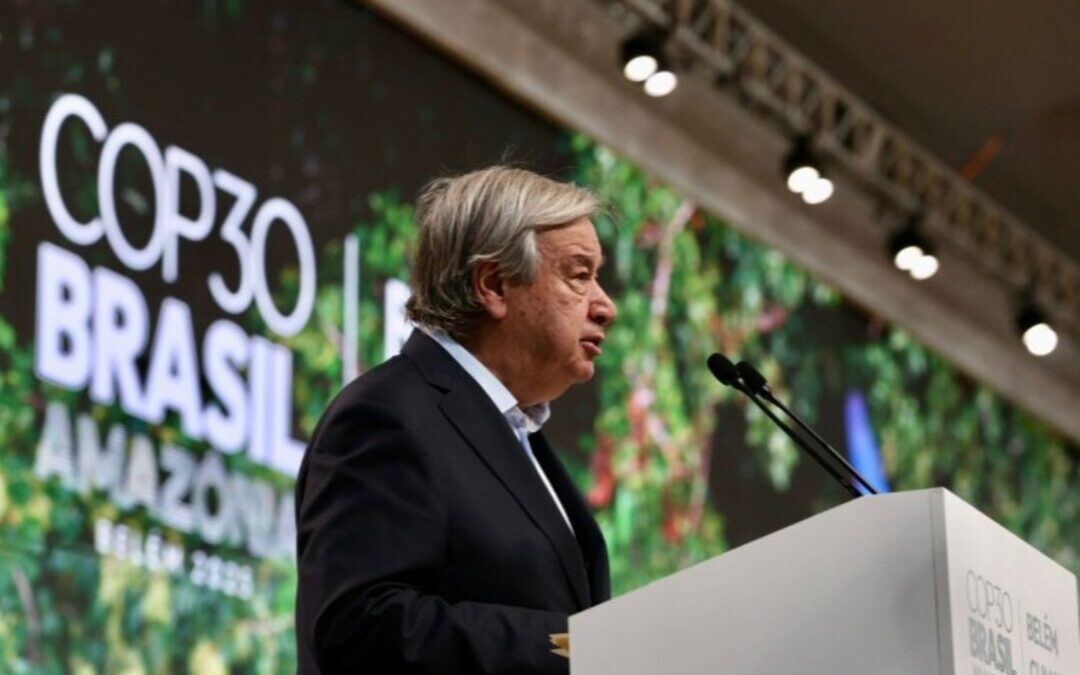COP30 Opens in Brazil With UN Plea for Urgent Climate Change Action
UN chief António Guterres urges bold global action at COP30 in Belém to prevent irreversible climate change impacts.
United Nations Secretary-General António Guterres warned world leaders on Wednesday that humanity is “failing to stay below 1.5 degrees Celsius,” calling on countries gathered at the UN Climate Change Conference, or COP30, in Belém to ignite a “decade of acceleration and delivery” to prevent the irreversible breakdown.
Speaking at the opening plenary of the World Leaders Climate Action Summit, Guterres said science now shows the planet will “inevitably” overshoot the 1.5°C limit by the early 2030s. He urged governments to act immediately to reduce the magnitude and duration of this overshoot.
“Every fraction of a degree means more hunger, displacement, and loss,” he said. “The 1.5°C limit is a red line for humanity — it must be kept within reach.”
He warned that even a temporary overshoot could push ecosystems past tipping points, expose billions to unlivable conditions and heighten risks to global peace and security.
Clean Energy Revolution Gains Ground
Despite the grim outlook, Guterres said the world has “never been better equipped to fight back.” He pointed to a surge in renewable energy deployment and record investments in clean technologies, adding that the clean-energy transition is now central to tackling climate change.
“Solar and wind are now the cheapest and fastest-growing sources of electricity in history,” he said, noting that almost all new power capacity added in 2024 came from renewables.
Investors poured $2 trillion into clean energy last year, $800 billion more than into fossil fuels, Guterres said. “Clean energy is winning on price, performance, and potential,” he added, calling it the key to both climate stability and economic opportunity.
Call for Political Courage
Guterres criticized governments and corporations that continue to subsidize fossil fuels and profit from climate damage. “Too many leaders remain captive to entrenched interests,” he said. “What’s still missing is political courage.”
He urged countries to move faster and together, emphasizing that “this COP must ignite a decade of acceleration and delivery.”
A Plan for Action
Guterres outlined three priorities for negotiators in Belém.
First, countries must close the “ambition gap” by aligning national climate targets with the 1.5°C goal. This includes supercharging renewable energy, halting deforestation by 2030, cutting methane emissions, and phasing out coal.
“No more greenwashing, no loopholes,” he said, urging nations to act on their previous commitment at COP28 in Dubai to transition away from fossil fuels.
Second, he called for a “credible path” to reach $1.3 trillion in annual climate finance for developing countries by 2035, with $300 billion mobilized each year by developed nations. “It’s time for implementation, implementation, and implementation,” he said, pressing for faster disbursement and debt relief for nations most exposed to climate change impacts.
Third, Guterres demanded a “climate justice package” that provides equity and opportunity to developing nations. He urged delivery of the pledged $40 billion in adaptation finance this year and expansion of affordable funding beyond 2025.
Indigenous Leadership and Climate Justice
Highlighting the importance of inclusion, Guterres said Indigenous peoples must lead the way in climate action. “Their knowledge and participation light the path to a livable planet,” he said.
He also stressed that a just transition must protect workers, empower communities, and ensure access to the Loss and Damage Fund for nations suffering the worst climate change impacts.
Concluding his address, Guterres said the United Nations will continue to support developing nations through its Climate Promise initiative and directed the UN Development Programme to help countries implement new national climate plans.
“The challenge is immense, but the choices are clear,” he said. “No one can bargain with physics. Choose to lead — or be led to ruin. Choose to make Belém the turning point.”
Also Read:
Rich Nations to Face Legal Reckoning Over Climate Finance at COP30
COP30 Opens in Brazil With UN Plea for Urgent Climate Change Action
Nirmal Menon
Related posts

Subscribe
Error: Contact form not found.


